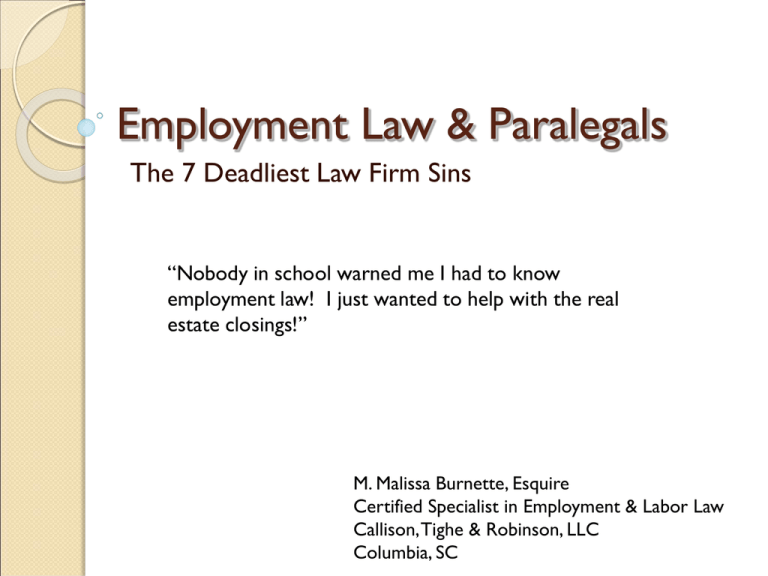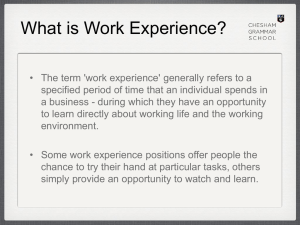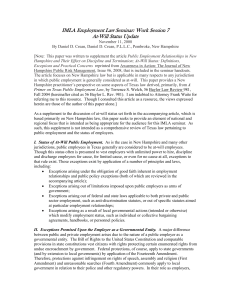
Employment Law & Paralegals
The 7 Deadliest Law Firm Sins
“Nobody in school warned me I had to know
employment law! I just wanted to help with the real
estate closings!”
M. Malissa Burnette, Esquire
Certified Specialist in Employment & Labor Law
Callison, Tighe & Robinson, LLC
Columbia, SC
Sin #1
(Just Go Ahead and Pull Out Your Wallet Now)
“They pay all the employees by salary so of course they
don’t have to pay them overtime.”
Even if an employee is paid a salary you must pay
them overtime if they work over 40 hours a week
and are considered “non-exempt” under the FLSA.
Exempt employees are:
“Learned Professionals”– people who have earned
advanced degrees
Those who meet the tests for “executive” or
“administrative” exemptions under the regulations
Cannot substitute compensatory time for overtime
in the private sector
Sin #1
Continued
NEWS FLASH: Most law office personnel are NOT exempt under
the FLSA! In 99% of law firms, the lawyers are the only exempt
employees.
Fair Labor Standards Act covers employers with 2 or more
employees.
If the employer fails to properly pay employees, an employee can
sue within a 3 year statute of limitations for willful violations.
The regular statute of limitations is 2 years.
Damages can include:
The difference between wages paid and wages owed
An equal amount as liquidated damages
Attorneys fees and costs
South Carolina Wage Payment Act, SC Code Section 41-10-10, et
seq. also permits employees to sue for treble damages for
unpaid wages. Covers employers with 5 employees. 3 year SOL.
Sin #2
(Way to Step Into It, Bozo)
“I know that guy and cancer runs in his family, so I wasn’t about to hire
him, even if he was at the top of his class. Our insurance costs would
hit the roof.”
Just how many employment discrimination laws can be violated in one
employment decision? This statement points to the ADA and the Genetic
Information Non-Discrimination Act of 2008, for starters.
Employment discrimination coverage depends on the number of employees
in the firm. Only 42 U.S.C. §1981 covers all size employers.
15 employees or more:
Title VII of the Civil Rights Act of 1964 protects from discrimination
based on race, sex (inc. pregnancy and sexual harassment), color, national
origin, and religion. (Equal Pay Act requires only 2 employees)
Americans with Disabilities Act protects qualified individuals with
disabilities from discrimination.
Title II of the Genetic Information Non-Discrimination Act of 2008
prohibits genetic information discrimination in employment.
Sin #2
Continued
20 employees: Age Discrimination in Employment Act protects employees
40 years of age and older
South Carolina Human Affairs Law:
Contains prohibitions against employment discrimination similar to
federal non-discrimination laws. Covers employers with 15
employees.
Employers with 50 or more employees within a 75 mile radius
must comply with 12-week leave requirements for employees and
family members with serious health conditions under the Family and
Medical Leave Act.
Congress is currently considering the Employment Non-Discrimination
Act (ENDA), modeled on Title VII, to prohibit workplace
discrimination against persons based upon gender identity or gender
expression. 15 employees.
Sin #3
(Please Tell Me You Did Not Actually Say That)
“She quit without notice so I think I’ll just hold her last pay check and
see how she likes that.. Or maybe I’ll deduct a couple of hours for the
aggravation she put me through.”
Not so fast. First, this is an at-will employment state and notice is
not required. And the South Carolina Wage Payment Act requires
payment of all wages due within 30 days. This will include
accrued vacation, or PTO unless a written policy notifies the
employee that it will not be paid upon separation from
employment
Employer may not withhold any amount from paycheck without
giving at least 7 days written notice. This is true even if employee
owes money to employer.
Employer must provide written notice of terms of employment
at inception of employment
Employees can sue for treble damages, costs and attorney’s fees.
Sin # 4
(Urban Legends)
“I know this is an at-will employment state, so I can fire anyone for
anything, and I don’t care if I did promise in the Employee Handbook
to pay two weeks’ severance pay.”
An employer or employee may terminate the employment
relationship at any time, as long as it is not an illegal reason. A
contract changes at-will status, and employee handbooks or
company policies without an adequate disclaimer can be deemed
a contract.
“Right-to-work” refers to an employee’s right to work without
being forced to join a union.
Employers can be unfair, whether it is morally right or wrong, as
long as their conduct is not unlawful, because South Carolina is
an at-will state.
Sin # 4
Continued
Employee handbooks can be beneficial because everyone in the office has
the same expectations regarding conduct and policies.
South Carolina legislature has passed a law guiding employers in placing
conspicuous disclaimers in handbooks. If done correctly, the handbook
is deemed not a contract; but even if criteria as to wording of
disclaimer are met, a handbook containing mandatory language
affording rights to employee may create a question as to whether the
at-will relationship has been altered.
Sometimes, well-meaning efforts to be a good and benevolent employer
can afford the employee rights that were never intended. These rights
are often found in progressive discipline policies. Ex.: entitled to 3
warnings before can be fired, regardless of severity of the offense.
Important: All policies should be framed in discretionary language.
There is no requirement to provide vacation leave, sick leave, or
severance pay because South Carolina is an at-will state. It behooves
law firms to have good policies to keep good employees. These
policies should be written with care, with a conspicuous disclaimer,
signed by the employee, and enforced consistently.
Sin # 5
(Dear God In Heaven)
“I think I’ll just log onto my co-worker’s personal e-mail account tonight to see
what she’s been up to.”
Does your co-worker have an expectation of privacy? Tread with caution.
The answer may depend on your law firm’s written policy governing
workplace computers and other technology, and the firm’s right to
monitor and search it’s own workplace, equipment, and computers, and
whether the policy is consistently enforced.
Quon v. Arch Wireless Operating Co., Inc. and its implications
Case decided by the U.S. Supreme Court: enforces concept that it is best
to have a solid written privacy policy and to make no exceptions.
Law firms must balance monitoring how employees are using their time
with respect for employees’ privacy to avoid complications.
If you want to check up on your employees it is best to do it before you
hire them. Background checks can be conducted with proper consent.
Also note, embarrassing scandals have been caused for employers as a
result of what employees have posted on social networking sites such as
Facebook. Employers can enforce policies about discussing work issues.
Sin # 6
(Get Thee Behind Me, Satan)
“He got a subpoena to court next week but he’s been out too
much already, so I fired him.”
No knee-jerk reactions and no retaliation! South Carolina
law protects employees from dismissal and demotion for
complying with a subpoena or serving on a jury.
Employers can be liable for up to a year of the employee’s
wages.
It is also illegal to replace someone for a “cheaper” but
unauthorized alien employee. This will cost you actual
damages, lost wages, and attorney’s fees.
Employers cannot retaliate for the filing of a worker’s comp
claim and nearly all discrimination claims. Non-retaliation
sections are also included in the Sarbanes-Oxley Act,
OSHA, the FMLA, FLSA, and others. Just don’t do it!
Sin # 7
(Oh No You Didn’t!)
“I could smell smoke on her clothes and you know we don’t
hire smokers.”
South Carolina Code prohibits personnel actions from
being taken against those who smoke outside of the
workplace.
However, there is no law requiring employers to
provide smoke breaks. There is actually no law that
requires breaks at all, but most employers offer a
lunch break if they want to keep any employees.
When hiring, remember that South Carolina law
protects union members from discrimination, and it is
a misdemeanor to fire an employee because of
political opinions or exercise of political rights. It is
also unlawful to discriminate against debtors in
bankruptcy.
Conclusion
Law firms must be good employers as well
as excellent lawyers
If you can’t figure it out, get HELP
M. Malissa Burnette, Esq.
Certified Specialist in Employment & Labor Law
Callison, Tighe & Robinson. LLC
P.O. Box 1390, Columbia, SC 29201-1390
803.404.6900 (O)
mmburnette@callisontighe.com









